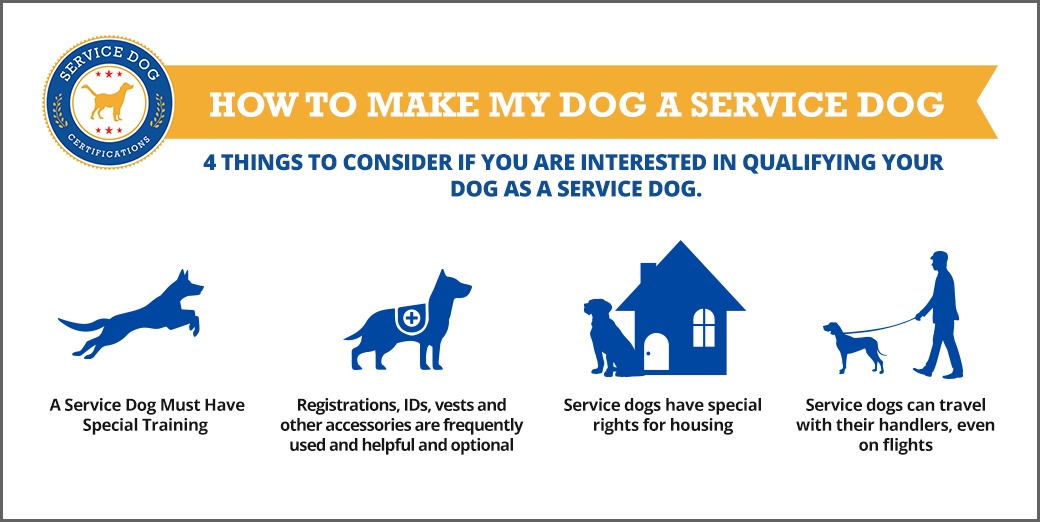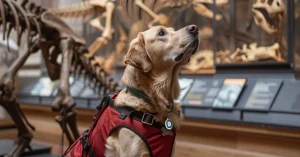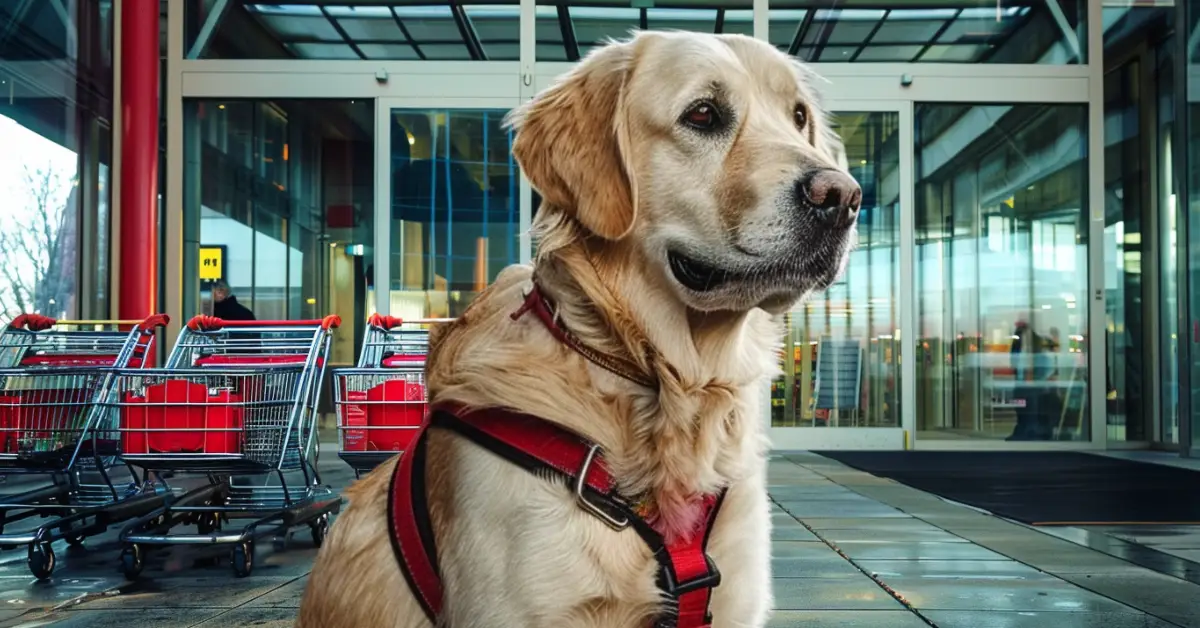Anxiety Service Dog Tasks

According to the Anxiety and Depression Association of America (ADAA), anxiety disorders are common within the U.S. About 18% (about 40 million) of all adults in the country have an anxiety disorder. Anxiety, if left untreated, can cause distress, depression and interfere with work and relationships. Treatments for anxiety include cognitive-behavioral therapy (CBT), medication, lifestyle changes, and service dogs. Learn how an anxiety service dog can help and what kinds of tasks they can do in this article.
Anxiety and Service Dogs
All of us experience stress. Stress is a normal part of life and can even motivate us to better ourselves and make progress. When stress becomes overwhelming and uncontrollable, however, it turns into an unhealthy form of anxiety.
An anxiety disorder can become persistent and excessive, making everyday situations challenging—maybe even impossible. People who have anxiety might avoid important social events due to their fears. They experience panic attacks or become overwhelmed in crowds, preventing them from having a healthy social life. Anxiety can impede work and school performance, limiting a person’s ability to succeed.

What Tasks Can a Service Dog Do for Someone with Anxiety?
In all the situations mentioned above, anxiety service dogs can offer vital assistance. More than a supportive presence, anxiety service dogs carry out essential tasks that help manage a person’s anxiety. The following are a few examples of the many tasks these dogs can offer:
Tactile Stimulation
Although many dogs lick their owners or perform nose bumps as a sign of affection, anxiety service dogs can do these actions on command in the presence of numerical distractions. Tactile stimulation—like repetitive licking—can change a person’s focus away from their anxiety, prompting them to use their own positive coping mechanisms and regain composure.
Deep Pressure Therapy
The body’s central nervous system manages sensory integration, processing information from the senses to respond appropriately. Unfortunately, anxiety can cause sensory overload, disrupting the central nervous system’s ability to react logically to the outside world.
A service dog can perform deep pressure or deep touch pressure therapy (DTP) to calm the nervous system down, enabling them to manage their anxiety.
Find an Exit
Because an anxiety attack can occur at any time, it helps if the person undergoing the attack can leave the area whenever necessary. An anxiety service dog can receive training to find the nearest exit upon command or cue, leading a person away from a distressing or embarrassing situation.
Crowd Control
People who have anxiety may experience claustrophobia in crowded situations. However, they can also feel boxed in even if only one or two people are in their personal space. An anxiety service dog can serve as a buffer between their handler and the people around them by placing itself between their handler and someone else.

Obtaining Emergency Phones or Medication
Anxiety service dogs can receive training to fetch emergency cell phones and medication. For example, an emergency telephone (designated for use only in emergencies) can help a person to obtain help as soon as possible. Additionally, anxiety service dogs can receive emergency medication to help their handler calm down.
Turning on the Lights
People who struggle with Post Traumatic Stress Disorder (PTSD), a type of anxiety disorder, are sometimes afraid of the dark. An anxiety service dog can enter the room first and flip on the lights, keeping their handler from suffering through being in the dark.
Performing Safety Checks
After experiencing a traumatic event, like a robbery or home invasion, a person can develop PTSD. An anxiety service dog may receive training to investigate an area or room before they enter, reassuring their handler that they’re safe. For many people with PTSD, getting affirmation of their safety is of utmost importance.
Hyper-Vigilance Reduction
Anxiety can trigger hyper-vigilance, making a person feel unsafe even in typical environments. A state of perpetual hyper-vigilance becomes distressing and disabling without treatment, making daily activities nearly impossible. An anxiety service dog can serve as a reality check for a person with anxiety. The dog can be a source of reassurance, allowing them to concentrate on their daily lives without worrying about unrealistic dangers.
A Calming Influence
When looking for the ideal anxiety service dog, temperament is critical. An intelligent dog who is gentle, calm, and not prone to agitation is the perfect candidate. A dog that’s anxious themselves can still function as an excellent pet but wouldn’t make for a good service dog in general.
In short, an anxiety service dog should be an overall calming influence to someone with anxiety. The tasks listed in this article are only a few examples of the many ways an anxiety service dog can help manage anxiety disorders. They serve as a stabilizing influence and are vital to their handler’s state of mind and well-being. More than a pet, an anxiety service dog allows individuals with anxiety to live a safe and happy life.
About the Author: The writing team at Service Dog Certifications is made up of folks who really know their stuff when it comes to disability laws and assistance animals. Many of our writers and editors have service dogs themselves and share insights from their own experiences. All of us have a passion for disability rights and animals.
7 comments
Leave a Reply Cancel reply
Latest Posts

Can you bring a service dog to a museum?
Yes, you can bring your service dog to the museum! All the major U.S. museums welcome guests with service animals in accordance with the Americans with Disabilities Act (ADA). There are some areas, however, that might be off-limits. Here’s what you should know if you plan to spend a day at the museum with your […]

Read More

How to Bring a Service Dog to Six Flags Magic Mountain
Service dogs are welcome at Six Flags Magic Mountain so long as they are, according to Six Flags, “trained to do work or perform tasks for people with disabilities.” Of course, your dog must be housebroken and remain on a leash or harness and under your control while at the park — and the park […]

Read More

When Stores Can Refuse Your Service Dog
According to the Americans with Disabilities Act (ADA), service dogs should be allowed into any store most of the time. A store owner can legally exclude a service dog if they are actively growling, snapping at, or frightening customers, or if the dog is obviously out of the control of its owner. Ordinary behaviors — […]

Read More


My concern is that the amount of attention my service dog gets often causes me more anxiety than managing without him. It causes me anxiety to have to decide if I can manage better with or without him. Is there anyway to reduce the questions and interest and requests for contact that my service dog constantly evokes? Lynne
You can only be asked two questions by third parties to verify your service dog. You may find having service dog paraphernalia helpful in warding off unwanted inquiries (i.e., a service dog vest, tag or ID card). Please see this article for more information: https://www.servicedogcertifications.org/psychiatric-service-dog/
I have the same issues when I go out. People have a tendency to approach me and my service animal and it causes me to have more anxiety. I feel like putting reminder patches like “no eye contact” etc. has seemed to help mitigate the issue, however, there will always be a few who aren’t aware of service dogs and the general do’s and dont’s.
Having service dog paraphernalia can help signal to others that your dog is a service animal and should not be bothered or touched while it is assisting you in public.
Oh my goodness! I SO feel your pain, Lynne!! My SD is for my PTSD/crowd control, really to help keep people away from me… Ha! Yeah right!! I suspected kids and things like that, but the first month starting Public Access was BEYOND OBNOXIOUS! People are very good about NOT touching my worker, but they truly don’t have a clue how much they distract US BOTH when they come over to ask all those HORRID BLOODY QUESTIONS. As a person with Autism, I wear noise cancelling headphones anytime I’m out working my SD, so these help as a visual cue whenever I ignore “that look” when you KNOW there just itching to start gushing about “how cute”.
I don’t know if this helps or not, because people will never NOT be curious, and I honestly take it as a sincere compliment now, when people (complete strangers-mind) simply MUST come over to say hi, because they are clearly acknowledging her excellent stellar behavior, and I look at it as a mark of my never-ending work with her.
More than anything though, as an Autistic person that abhors people, Lucy (my SD) literally forces me into situations where I have to be at least pleasant and somewhat sociable, but in a way where I know I’m safe, and the focus is entirely about my sweet worker.
I dunno. There’s good and bad. To be extremely frank, the first couple hundred hours of PA work, I actually LITERALLY got far more anxiety working her, FEARING all the what-if’s, than I was getting going out shopping etc, BEFORE implementing an SD in my life. The purpose of SD’s are to help aid our disabilities so we can live more fulfilled lives, so if your having more problems than relief, you may need another solution. OR, this could be an excellent exercise to be assertive and straight-forward. I have no problem WHATEVER telling people “Thank you so much, but we’re working right now.”
You WILL get used to the attention! It’s like walking down the halls in high school with all the looks and giddy talking, but on steroids…
Good Luck, don’t be discouraged!!
I have this very problem. People just don’t seem to understand the concept of DO NOT touch or talk to my dog while it’s working. So I typically opt for a vest even tho he doesn’t HAVE to wear it- but even then, people just DONT get it.
Having him with me tho, def lessens my anxiety enough to be able to tell people to basically F off because he’s working. Lol
We can sympathize. This is a problem that many service dog owners have to contend with. Using a vest, tag, leash, ID card or other accessory certainly helps, but many intrusive people will still pet or approach a service dog. More has to be done to educated the public about properly respecting the boundaries of service dog owners.